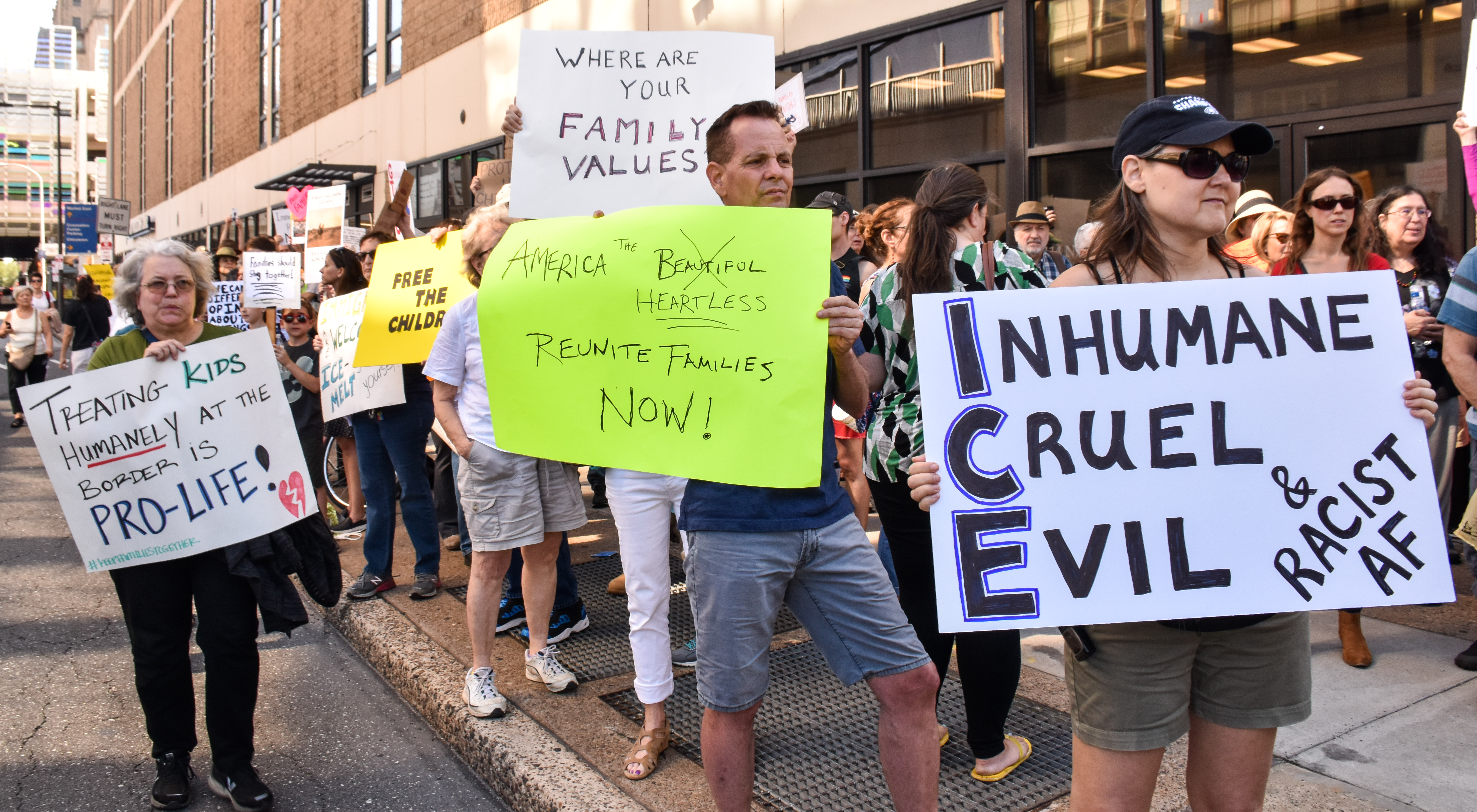
By Hye-Jin Kim
AsAmNews Staff Writer
Demanding the reunification of migrant families once torn apart at the U.S.-Mexico border, Americans marched yesterday in cities across the country while lawmakers on Capitol Hill sweat in gridlock over immigration reform.
Last week, the House rejected a hopeful compromise floated by Rep. Raul Labrador (R-Idaho) that included a “merit-based green card program” — a system that awarded “points” to permanent visa applicants, according to Politico. And though the bill was ultimately shot down, the emphasis on “merit” seems to echo a leaked draft earlier this year from the Department of Homeland Security. The draft, first reported by the Washington Post, outlines how the department might consider an applicant’s use of public welfare in granting permanent residency.
If the idea emerges again in future reform, it could force new immigrants to choose between reuniting their immediate family and life necessities such as food, shelter and healthcare. Other factors not related to financial stability, such as English fluency and health status, could also make it more difficult for permanent residents to bring over family living abroad. Hyper-vigilant and wary of such changes, advocates of Asian American communities have already begun to fight back.
Since parents and children of permanent residents are automatically eligible for green cards, it’s a common pathway for families looking to reunite in the states. If immigrants can be denied a visa based on the use of social benefits that they qualify for, this pathway could be jeopardized as immigrants struggle to meet basic living standards with little to no public assistance.
And though children of migrant workers, mostly of Latino descent, have dominated U.S. headlines, some Asian immigrants could face a similar decision — life necessities or permanent residency?

The Migration Policy Institute estimated in 2016 that 14 percent of the country’s undocumented immigrants came from an Asian country. In the U.S., the sixth most common nationality among “Dreamers” enrolled in the Deferred Action for Childhood Arrivals program is South Korea — after Mexico, El Salvador, Guatemala, Honduras and Peru, respectively.
“The proposed regulation is a direct attack on Asian Americans and Pacific Islanders,” said Tung Nguyen, former chair of the Obama administration’s advisory commission on Asian Americans and Pacific Islanders. “A direct attack on legal immigration is a direct attack on all of us. For those who have family members they want to bring over, for those who are here as legal immigrants, for those who sponsor.”
The change would not affect legal residents who are applying for citizenship; it would only affect immigrants first seekin
g permanent residency. Furthermore, not all immigrants would be subject to more scrutiny based on welfare. Refugees, human trafficking victims, self-petitioners under the Violence Against Women Act, certain U.S. parolees and several other categories of non-citizens would be exempt.
Currently, immigration officials can only consider two types of benefits in weighing applications: cash assistance for low-income households and “long-term institutional care” –such as psychiatric wards or nursing homes — on the government’s dime. If the department’s proposal or any variation of it in a sweeping immigration bill is adopted, it could open up a host of non-cash welfare programs for consideration, as well as other personal traits like English-speaking ability and existing health conditions for those who are self-insured. This would make it more difficult, even for permanent residents with financial security, to sponsor their closest relatives.
“Immigrants who apply will not be expected to use any public resources,” Nguyen said to AsAmNews. “And the leaked drafts indicate they’re not going to look at how much money you have, or how well you can take care of yourself. They’re also going to use how well you speak English, your age, your health status.”
The growing backlash against welfare recipients could be driven in part by racism, according to a recent study from Stanford and University of California Berkeley.
“We found that threatening [white Americans’] of their economic advantage over minorities led whites to report greater opposition to welfare programs, but only if these programs were portrayed as primarily benefiting minorities, not if they were portrayed as benefiting whites,” reads the report that was published this year.
Whites are still major beneficiaries in several U.S. welfare programs that might be considered in visa decisions. According to the 2016 census, whites made up 43 percent of Medicaid recipients and 36 percent of food stamp recipients.
Nguyen, who is on the board of AAPI Progressive Action, has already begun organizing local Asian American advocacy groups to flood the Department of Homeland Security with public comments online, if or when, the new policy is released.
Their initiative aims to empower those who might be affected, spread public awareness about the potential change in Asian immigrant circles and slow down its implementation as the department is required to respond to each public comment before any change is put into effect.
“We want to empower the community so that all these people who have a vested interest in legal immigration, or any kind of immigration, will say ‘No, it’s not fair!’ So they will have a voice,” Nguyen said.
AsAmNews has Asian America in its heart. We’re an all-volunteer effort of dedicated staff and interns. Check out our Twitter feed andFacebook page for more content. Please consider interning, joining our staff or submitting a story.
